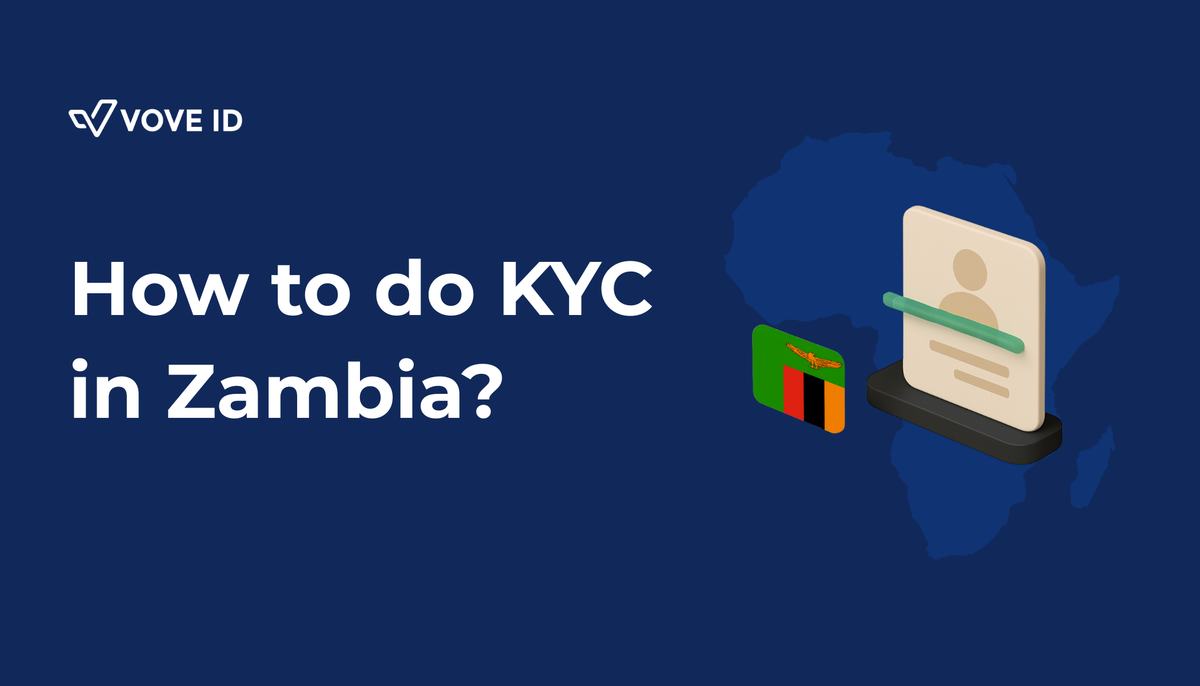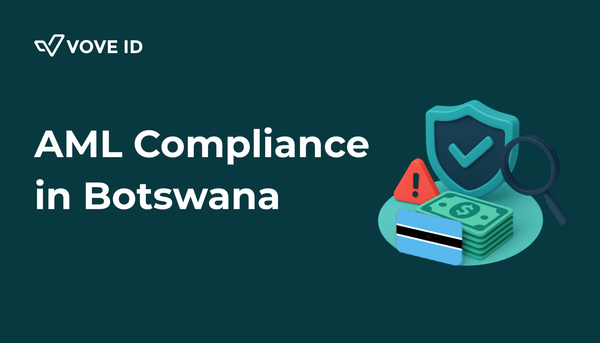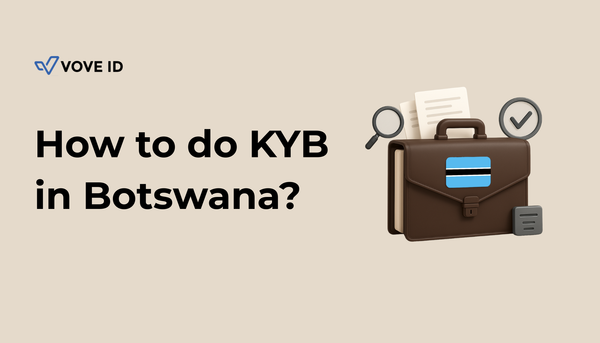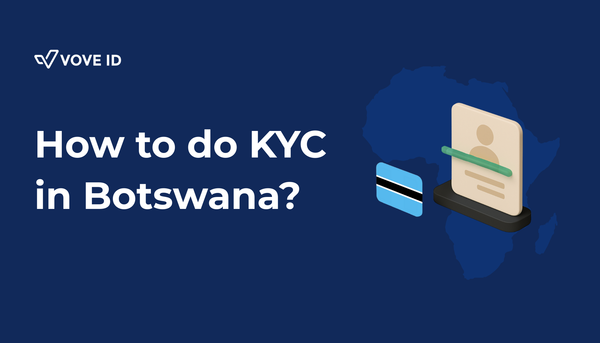KYC Compliance in Zambia, 2025 Guide for Fintechs and Digital Businesses
KYC compliance in Zambia, digital identity, eKYC, AML, fintech regulations. Learn how businesses stay compliant under BoZ and FIC rules in 2025.

Fintech adoption in Zambia continues to grow, supported by mobile money penetration, digital payments infrastructure, and increasing participation from regional investors. As the ecosystem evolves, regulators are strengthening the AML and KYC framework to ensure customer protection and financial system stability. Zambia’s alignment with ESAAMLG and FATF recommendations has accelerated updates to local directives, especially in digital onboarding and virtual asset oversight.
For fintechs, mobile money providers, crypto platforms, and digital lenders, understanding Zambia’s KYC rules is essential for safe expansion, cross-border growth, and investor readiness. Many teams are already upgrading their verification flows with modern eKYC tools, and solutions like VOVE ID help streamline identity checks, biometrics, and AML screening to keep onboarding fast and compliant.
Regulatory framework
Supervisory authorities
- Financial Intelligence Centre (FIC) is the national FIU overseeing suspicious transaction reporting, national risk assessments, and AML guidance.
- Bank of Zambia (BoZ) regulates banks, payment services, mobile money operators, and since 2023, virtual asset players under new directives.
- Ministry of Home Affairs and Internal Security manages the National Registration Database and identity systems.
- Ministry of Finance coordinates the AML strategy in line with ESAAMLG requirements.
Key laws and directives
- Financial Intelligence Centre Act No. 46 of 2010, amended in 2020.
- Prohibition and Prevention of Money Laundering Act No. 14 of 2001.
- Forfeiture of Proceeds of Crime Act No. 19 of 2010.
- Anti Terrorism Act No. 21 of 2007.
- BoZ AML and CFT Directives of 2017 for financial institutions.
- BoZ Directives on Virtual Assets and VASPs (2023–2024), which introduced stricter rules on:
- the Travel Rule,
- source of funds checks,
- beneficiary verification across cross-chain transactions,
- enhanced reporting obligations for crypto exchanges, brokers, and wallet providers.
These updates reflect Zambia’s effort to modernise the regulatory environment and align with FATF’s 2023–2024 expectations for virtual assets.
Regulatory Sandbox and digital identity pilots
Between 2024 and 2025, BoZ piloted several sandbox initiatives in digital identity, open banking, and interoperable KYC frameworks.
The government is exploring limited API access to the National Registration Database, potentially through NAPSA or directly via the Ministry of Home Affairs.
This is not yet available to the whole market, but large players like MTN MoMo, Airtel Money, and Zanaco already operate under special agreements that grant partial verification access.
If rolled out in 2025–2026, the API will significantly reduce onboarding friction and improve data accuracy for fintechs and financial institutions.
KYC and Customer Due Diligence in Zambia
Accepted identification documents
- National Registration Card (NRC)
- Passport
- Driver’s licence
- Proof of address (utility bill, tenancy agreement, or employer confirmation)
Foreign nationals typically use their passport and immigration documents.
Customer Due Diligence requirements
- Obtain and verify identity information using independent and reliable documents.
- Understand the purpose and intended nature of the customer relationship.
- Assess customer risk using a documented model.
- Conduct ongoing monitoring of transactions and behaviour.
- Submit Suspicious Transaction Reports to the FIC when required.
Enhanced Due Diligence
EDD applies to higher risk customers, such as politically exposed persons, cross-border traders, crypto-asset users, or customers with unclear source of funds.
EDD includes deeper checks, more documentation, and more frequent monitoring.
Digital onboarding and biometric verification
The market standard for digital KYC now includes:
- selfie and liveness detection,
- OCR extraction from NRC or passport,
- cross checking with internal risk databases,
- automated fraud screening.
A growing number of local companies prefer regional verification partners due to high costs among foreign providers and increased sensitivity from the FIC regarding storage of biometric data outside Zambia.
This trend has accelerated the adoption of regional and hybrid solutions, including locally hosted biometric engines.
Key challenges for businesses
1. Identity data fragmentation
The National Registration Database is not yet broadly accessible, which limits fully automated verification.
2. Cash heavy economy
Large portions of the population still transact in cash, which increases AML risk and requires stronger monitoring.
3. Compliance costs
Fintech startups face rising operational costs related to KYC, biometric checks, and data storage requirements.
4. Regulatory uncertainty for virtual assets
The new BoZ directives introduce stricter rules, but operational clarity and licensing processes remain in transition.
5. Connectivity and infrastructure gaps
In certain areas, inconsistent connectivity affects the quality of biometric capture and digital onboarding success rates.
Opportunities and emerging trends
- Rapid mobile money growth continues to drive financial inclusion and digital onboarding.
- Investor interest in Zambia’s fintech sector remains strong, especially for payments, lending, and remittances.
- Biometric technologies are gaining adoption across banks, fintechs, and wallet providers.
- AI driven compliance tools improve fraud detection and support real time monitoring.
- Regulatory sandbox projects may soon introduce shared KYC systems and limited identity API access.
- Crypto and virtual asset regulation is maturing, opening opportunities for compliant exchanges and blockchain service providers.
Role of technology and how VOVE ID supports compliance
Digital identity platforms play a key role in streamlining customer onboarding, especially for fintechs that operate across multiple channels. Automated document checks, biometric authentication, AML screening, and fraud prevention tools reduce manual work and help businesses stay aligned with the regulatory framework.
VOVE ID supports fast, secure onboarding by verifying NRCs and passports, enabling biometric verification with liveness detection, and offering AML screening workflows. This helps businesses reduce friction, improve accuracy, and avoid compliance gaps while scaling in Zambia.
Conclusion
KYC compliance in Zambia is becoming more structured and risk driven as regulators modernise the AML ecosystem and push for stronger digital identity standards. For fintechs and digital platforms, adopting robust KYC processes and the right technology helps reduce fraud, meet regulatory expectations, and build trust with customers and investors. With digital onboarding becoming the norm, businesses that invest in reliable identity verification will be best positioned for growth in 2025 and beyond.
If you want smoother digital onboarding in Zambia, we can walk you through how automated KYC fits your product roadmap.




